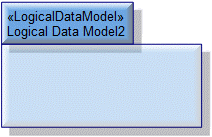Logical data model (UPDM - MODAF aliases)
Creation
To create a Logical Data Model:
• From the model or a UML Package: right-click the Package, point to New, point to MODAF, point to Operational, and then click Logical Data Model.
• From an
OV-7 Information Model: click the

Logical Data Model toolbar button, and then click in free space on the diagram.
Appearance
When shown on an
OV-7 Information Model, a Logical Data Model appears as follows:
Relationships
There are no relationships that are of significant importance to a Logical Data Model.
The following sections provide information about how a Logical Data Model is used in the model.
Create a Logical Data Model from

UML Model

UML Package
Create from a Logical Data Model
In addition to the UPDM elements that can be created from all UPDM elements (
Alias,
Definition,
Information, and
Metadata):
Shown on these diagrams, tables and matrices
In addition to the
AV-2 Integrated Dictionary and
TV-1 Standards Profile, which can show all UPDM elements:
UPDM writeable properties
The following writeable properties are available on the Logical Data Model tab of a Logical Data Model element's Property Pages:
• URI


 Logical Data Model toolbar button, and then click in free space on the diagram.
Logical Data Model toolbar button, and then click in free space on the diagram.
 UML Model
UML Model UML Package
UML Package